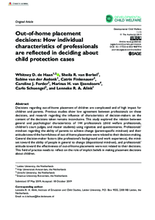Abstract
Decisions regarding out-of-home placement of children are complicated and of high impact for children and parents. Previous studies show low agreement between professionals on these decisions, and research regarding the influence of characteristics of decision-makers on the content of the decisions taken remains inconclusive. This study explored the relation between general and psychological characteristics of 144 professionals [in the Netherlands] (child welfare professionals, children’s court judges, and master students) using vignettes and questionnaires. Professionals’ mind-set regarding the ability of parents to achieve change (parent-specific mind-set) and their attitude toward the harmfulness of out-of-home placements were related to their decision-making. General decision-maker factors (the professional’s background and work experience), the mind-set toward the ability of people in general to change (dispositional mind-set), and professionals’ attitude toward the effectiveness of out-of-home placements were not related to their decisions. This field of practice needs to reflect on the role of implicit beliefs in making placement decisions about children.

